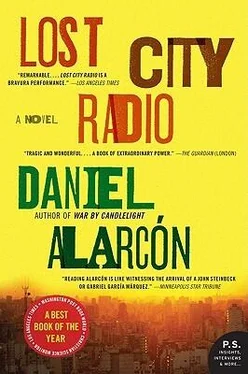Then the fighting in the distance flared out, and the placid years began. His own son grew up strong. The school was rebuilt, and a procession of teachers from the city began coming to 1797. They didn’t stay long, but they took the place the army had once occupied in the village’s collective imagination: the only tangible evidence that somewhere a government existed, and it knew of them. This, too, was a positive development.
The IL arrived on an early October day of limpid sun, firing shots in the air and demanding to be fed. They gathered the village folk together, and one of them, a dark-eyed young woman, spoke shrilly of the victory that awaited them all. Still? Even now? She was thin enough and young enough that Zahir allowed himself to feel pity for her. Her hair was tied back loosely, and when she raised her arms, he could see dark stains. Then she fired a shot in the air, and it was as if a scrim had been lifted.
“But the war is over,” Zahir said. Softly at first.
A masked guerrilla walked toward him. Zahir knew what was coming, or thought he did, but when the butt of the rifle struck in his stomach, his vision went gray, and he doubled over, clutching helplessly at his midsection, fully expecting his organs to spill from his body. The guerrilla kicked him, called him a collaborator, and this word struck Zahir as right and just, and so he resolved to take his beating like a man. He heard a child crying out, and imagined it must be Adela’s boy. He felt something not unlike pride. He winced, pressing tears from the corners of his eyes, but the boots bruised him like tender caresses.
When he came to, the IL was announcing tadek . This he had not expected. His vision was blurry, and a dull pain spread out from his belly to encompass his entire torso, his heart, his neck. He blinked: his brain wasn’t right either. They had all been taken to a clearing, and the sun beat down on them with blistering intensity. He was being held up by two women, and everyone was there: an entire village of frightened adults standing shoulder-to-shoulder in a circle. Zahir stood rigidly, only vaguely aware that it had begun, that the boy was loose and drunken among them, ready to accuse somebody. He could barely see the child but could make out his rigid movements, stumbling now to the left, now to the right, hands before him grasping, as if teasing some meaning from the air. Each time he approached the edge of the circle, everyone tensed, and those most in danger backed up ever so slightly. The IL kept a strict watch, firing shots into the air. At one point, Victor sat down in the middle of the circle, balling his fists and pressing them against his temples, until an IL man stepped in, nudging the boy to his feet. “Go on,” he said. “Find the thief.”
It’s coming, it’s coming: Zahir could see now, and stand on his own, but the women still held him. One of them whispered in his ear: “Don’t be afraid.” It was Adela’s voice, but he didn’t turn or say anything in response. Maybe she was talking to herself, he couldn’t be sure. He wasn’t scared; three deaths would be atoned for. Wasn’t he responsible for this orphan? The boy tumbled and fell; now he stood again. There was dirt on his knee. He was crying, he was looking for her. “Mother,” Victor said, and Zahir felt Adela shrink behind him. No one, it seemed, had breathed in many minutes. The shots came every thirty seconds or so, and each time, the boy stopped and looked up, as if searching for the bullet’s trajectory in the bright sky. Then Victor found her — find me , Zahir thought — and trundled in her direction. It’s coming, it’s coming: but before he stepped forward to claim his guilt, Zahir was able to see the boy’s eyes: glassy with tears, fearful, focused on something distant and invisible, on some dark spot in the forest or a cloud shaped like a beast.
Then the boy touched him, and everything else happened in an instant: with guns at the ready, the IL led the town in baleful chant of “Thief! Collaborator!” The women were crying but they shouted, because they were afraid not to. Zahir caught sight of his wife then, her face red and teary, helpless and shrinking. Another woman held her so she wouldn’t collapse. Where was his son? His daughter? He squinted; there was so much light upon him; then he was lashed to a tree stump, and then he was screaming. The IL sang patriotic songs. His new life began with music.
THE SHOW Norma had imagined goes this way: suddenly, there are no restrictions, and all names are fair. The accusations that had been published after the war — that Rey had been an IL assassin, a messenger, or a bomb-thrower — these are rendered moot. There are only missing people, their innocence or complicity unimportant, irrelevant. The show begins: Norma plays a song, the calls come. I knew a professor, a voice says, he was my teacher at the university, and he disappeared.
When?
At the end of the war.
What did he teach?
Botany. He loved the forest, but not the way a scientist would. The way a poet would. He knew the basic stuff, the chemical composition of the soil in different river valleys. The patterns of rainfall and flooding. But that wasn’t it. What he most cared about—
And what was his name?
The caller hangs up abruptly. Next.
I knew a man at the Moon who was fascinated by jungle juju. He said everything we were seeing was a hallucination. That in the real world people didn’t do things like these to each other.
And what sorts of things were they doing to you?
Dial tone.
Another caller: I had a friend who worked once in Tamoé, gathering information for the census. He said the people had nothing except nearly infinite stores of patience, that they wanted only to keep what little they had and be left alone.
But why wouldn’t people leave them alone?
Each time, the callers come closer; it’s almost coy, the way they dance around him. After a dozen calls, Rey’s life has been described completely: colleagues, acquaintances, friends from every era of his short life. The boys who betrayed him that night of the fire have called to ask about him, and they have even apologized: we were afraid, they said. We were just children and the town wasn’t the same after Rey left. Where did he go? A call has come from a man who was with them the night of the first Great Blackout: when you said you’d been to the Moon, I winced. I’d been there too. And there are so many more: a cop who knew Trini. A man with a jungle accent who claimed to be an artist. A woman who was IL: she suspects that they knew the same people. But no one can remember his name. Who is this stranger? Can’t anyone remember? It’s been so long. Norma is sweating. Even in her imaginary show, she is balanced delicately above a precipice; even here she is afraid. Then it is her own voice she hears: I knew a man, she says, or was he a boy then, this man who took me dancing, who charmed me, who blew smoke into the bus as we rode together across this beautiful city, across the city as it was before the war — does anyone remember what a place this was? And this man, this boy, this lovely and terrifying child, he let me touch him and I loved him until a soldier came and took him away. For my entire life, he has been a great and disappearing angel, a vanishing act, a torturer, and now he’s gone and the question is, for how long , and the answer I fear most is forever .
And here the dream ends, here her grief runs into the reality of it. She can’t say his name. She tries, but she can’t. Someone else must do it for her.
It is nearly morning in the city and the war has been finished for ten years. Crimes have been forgiven, or at least forgotten, and still her Rey has not returned. She buried his father without him. She placed an obituary in the paper. It read: “Survived by his son…” The war had been over for three years then, and it felt like a lie. No one came to the funeral. She hadn’t seen the old man in many months. They had nothing to say to each other. Once, her father-in-law had made it past the screeners and onto the air. At first she hadn’t recognized him.
Читать дальше












